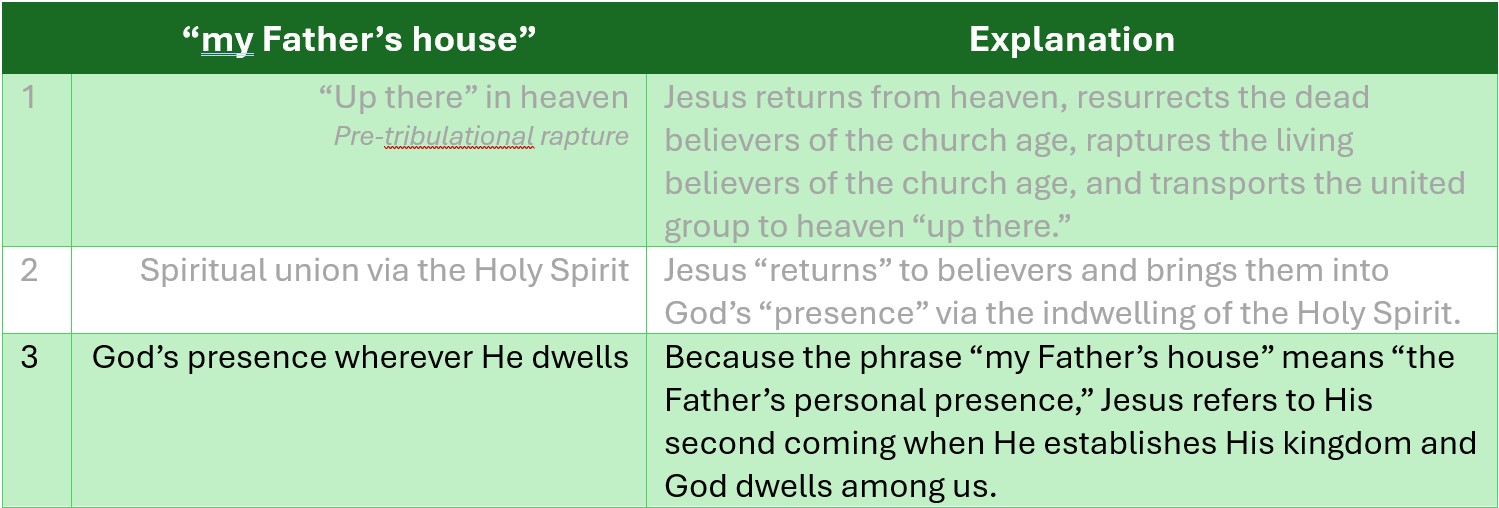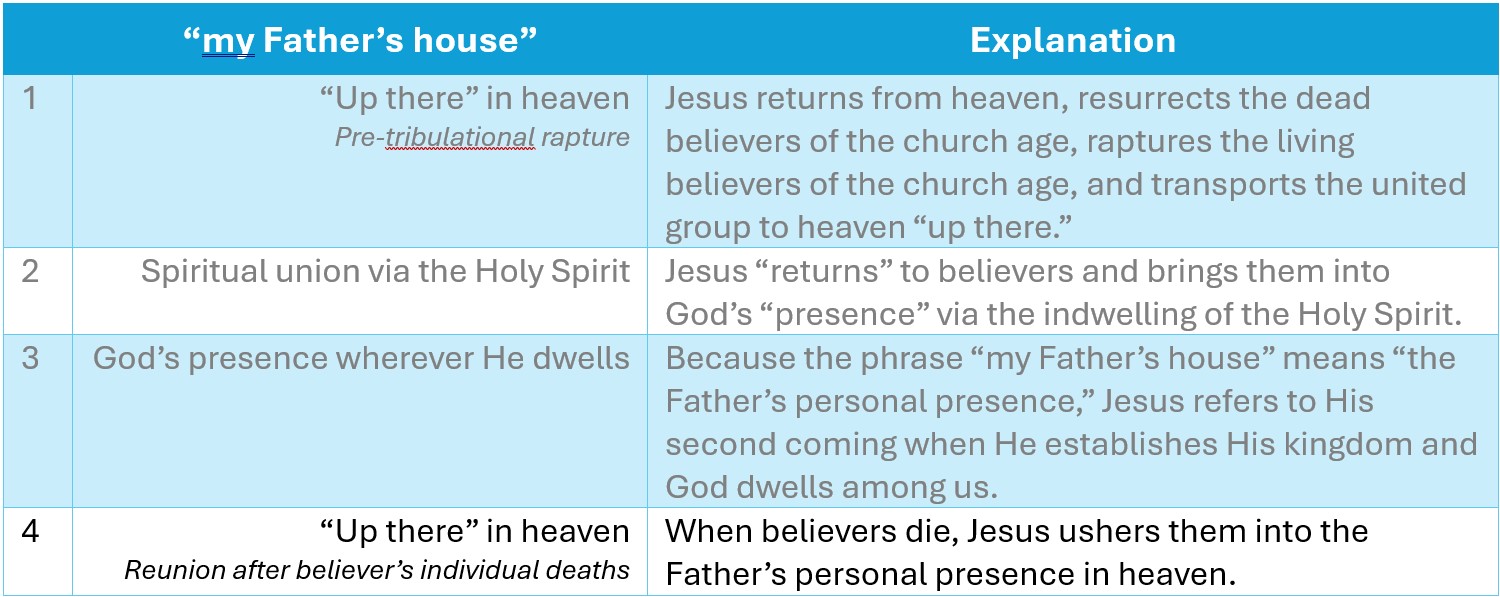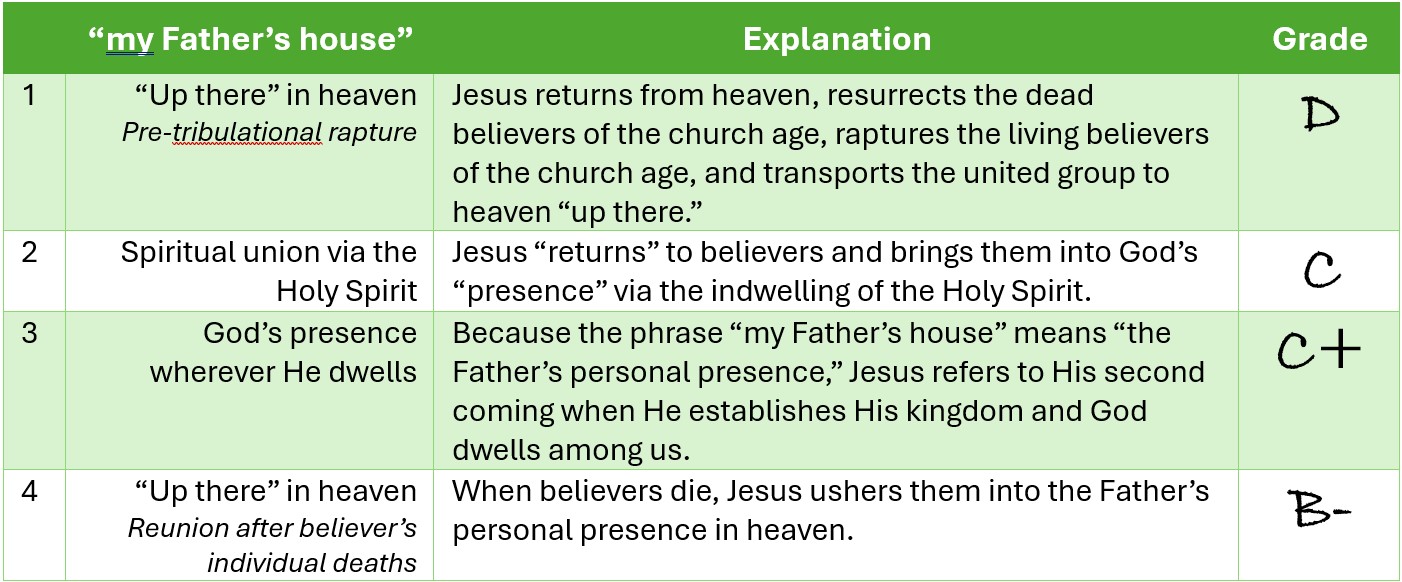John 14:1-3 and the Rapture (Part 4)
Image

What is Jesus saying at John 14:2-3? What is “my Father’s house?” Where is it? When will Jesus take believers there? In the last article, we examined the theory that it refers to being “up there” in heaven, and that Jesus takes believers there at an event called the pre-tribulational rapture. We concluded this idea isn’t supported by the text and gave it a “D” rating for probability. That doesn’t mean the pre-tribulation rapture is false—it just means to “see” it in John 14:2-3 you must smuggle it in from elsewhere.
See the rest of the series here. Today, we’ll look at three other options in turn. Here we go …
Option 2

Option 2 relies heavily on Jesus’ promise of His “presence” via the Holy Spirit. To be sure, Jesus has quite a lot to say about this in His farewell address. But, as we’ve seen, Jesus discusses both His physical and spiritual reunion with believers, and differentiates between the two. The larger biblical story shows us that (a) Pentecost triggers the spiritual reunion via the Holy Spirit (Lk 24:49; Acts 1:4-5, 8; 2:1-13), while (b) Jesus’ second coming is the physical reunion (1 Thess 4:13-18).
Because (a) Jesus speaks of a physical departure, and therefore (b) the disciples ask questions about this physical departure, and (c) John 14:1-3 is Jesus’ comforting answer in response to His statement about a physical departure, and (d) Jesus’ farewell message shifts between various physical and spiritual reunions, then (e) evidence supports that Jesus’ spiritual reunion with believers doesn’t exhaust the scope of Jesus’ reunion promises in this passage.
Evidence supports a “C” rating for the idea that John 14:1-3 is about Jesus’ spiritual reunion with believers via the indwelling Holy Spirit. It is a logical deduction without explicit or implicit support, but based on Jesus’ teaching elsewhere in His farewell talk.
Option 3

Option 3 hinges on “my Father’s house” bring a figurative expression for “God’s personal presence,” and not a fixed location. It is not a spiritual presence, but a real-time physical proximity to God Himself (like Isaiah 6). Because the bible’s storyline ends with Jesus returning here to (a) punish the wicked, (b) reward the righteous, (c) defeat Satan and his agents of evil, (d) create a new heaven and a new earth where righteousness will reign, so God can dwell here with His community, then (e) God’s “house” will shift from heaven to earth (Rev 21:3, 22).
So, the reasoning goes, Jesus’ promise in John 14:1-3 is that He will return (the second coming) and bring all believers to be in God’s presence with Him. The spiritual reunion via the Holy Spirit is well and good, but there’s certainly more. “[T]he hope of his return and of their being with him in the Father’s presence still remains the ultimate goal.”1
As with Option 2, the difficulty isn’t so much that Option 3 is wrong but that it’s incomplete. Jesus shifts very quickly from a physical return to a spiritual reunion between Jn 14:2-3 and Jn 14:4. Add to it, in the larger farewell talk Jesus pivots repeatedly between (a) a physical reunion at the second coming, (b) a spiritual reunion at Pentecost via the Spirit, and (c) a physical reunion at His resurrection on Easter morning. This makes one wonder if there is more here than simply His second coming. Still, immediate context favors Option 3.
The evidence supports a C+ rating for Option 3. It’s a logical deduction with support from the immediate context, but ambiguities remain from the context of Jesus’ larger farewell talk.
Option 4

Option 4 makes good sense, though commentators often dismiss it unfairly. The “Father’s house” is clearly elsewhere right now, and when believers die their souls do indeed go into God’s personal presence (Lk 16:19-31; Rev 6:9-11; 7:9-10). It takes Jesus’ words seriously, it fits the context, and it doesn’t require the reader to “explain away” difficulties. Jesus has “ascended into heaven” (Heb 4:14), and in the real “temple” in heaven Jesus has entered right into God’s presence for us (Heb 6:19), and Jesus Himself said He wants believers to be with Him in that place (Jn 17:24).
One nagging concern here is that, again, Jesus speaks of His return in so many contexts throughout the whole talk (Jn 13:33 – 16:28) that it’s tempting to see Him speaking of more than just “you’ll go to heaven when you die.”
Evidence supports a B- reading for Option 4. It is a somewhat weak implicit teaching, and Options 2 and 3 offer up persuasive alternative theories. If there is one “best answer,” this one is it. “This blessed promise is fulfilled in death for all believers who die before the Second Coming. Jesus comes for us then also.”2
Conclusion—the hybrid option
Here is the report card for the four options:

In its immediate context, John 14:2-3 speaks of Jesus “coming” for believers at their death to bring them into the Father’s personal presence. This is the best explanation, it will preach, and it’s biblical. However, we should weigh Jesus’ words at John 14:2-3 considering the entire farewell address and see His promise of safe and sure transport to the Father’s presence as a multi-stage promise3 in the following order:
- First—the promise of “seeing” the Father and Son via the indwelling Holy Spirit, triggered at Pentecost.
- Second—the promise of physical reunion with the Son in the Father’s presence at death.
- Third—the promise that believers will be with Jesus in the “Father’s house” here, in a new heaven and a new earth, after the second coming.
This is a hybrid of Options 2-4 (the first option should be dismissed). One writer explains:
The coming again of the Lord is not one single act,—as His resurrection, or the descent of the Spirit, or His second personal advent, or the final coming to judgment; but the great summary of all these, the result of which shall be, His taking His people to Himself to be where He is. This coming of His is begun (ver. 18) in His Resurrection—carried on (ver. 23) in the spiritual life (see also ch. 16:22 ff.), the making them ready for the place prepared;—further advanced when each by death is fetched away to be with Him (Phil. 1:23); fully completed at His coming in glory, when they shall for ever be with Him (1 Thess. 4:17) in the perfected resurrection state.4
Jesus has not left us as orphans—not now or ever.
Notes
1 Colin Kruse, John, in TNTC (Downers Grove: IVP, 2003), p. 293.
2 A. T. Robertson, Word Pictures in the New Testament (Nashville: Broadman, 1933), Jn 14:3.
3 Both Alvah Hovey (John, p. 281) and B.F. Westcott, The Gospel According to Saint John (London: John Murray, 1896), p. 281 support this. See also C.K. Barrett, The Gospel According to John (London: SPCK, 1955), pp. 381-382.
4 Henry Alford, The New Testament for English Readers, new edition, vol. 1 (London: Cambridge, 1872), p. 574).
Tyler Robbins 2016 v2
Tyler Robbins is a bi-vocational pastor at Sleater Kinney Road Baptist Church, in Olympia WA. He also works in State government. He blogs as the Eccentric Fundamentalist.
- 713 views
Tyler,
I appreciate the depth of your research and scholarship, but I really don't think this passage is that complex.
These verses have been called "the rapture in seed form" (a reference apparently coined by Chafer), and I agree with that wholeheartedly.
The disciples would have been very familiar with the idea of a "coming" of the Messiah (i.e., Dan. 7:13-14). But this is very different—much softer and gentler. He is not coming here in judgment to establish His kingdom. He is merely receiving His disciples to take them to the place He has prepared for them. In my thinking, this not only fits with a pretribulational rapture, but actually strengthens the proof that there must be two aspects to Christ's second coming (rapture and return).
Not to practice guilt by association, but I am sure you are aware that the "coming at death" view has long been associated with liberal theology.
So, don't dismiss the rapture view quite yet!
Blessings!
Church Ministries Representative, serving in the Midwest, for The Friends of Israel Gospel Ministry
I find it interesting that you give a D grade to the rapture interpretation and a B- to the go-to-heaven-when-you-die interpretation, yet I really can't see a difference between them in terms of their relationship to the text itself. It just seems that you decided to reject the pre-trib view and so gave it a bad grade.
As far as your appeals to the greater context of the Upper Room discourse, I still don't see how the rest of Jesus' convo with his disciples has any bearing on the specific meaning of 14:1-3. The fact that they discussed other things including his resurrection and the coming of the Holy Spirit doesn't really give any evidence one way or the other as to whether he has the rapture in view there.
In the end, the best we can say is that John 14:1-3 neither demands nor precludes a pre-trib rapture. Your presuppositions will determine how you choose to interpret the meaning of Jesus' words.
I appreciate the interaction. I gave the pre-trib position a “D” grade according to the grading metrics I mentioned in the first or second article. Essentially, the text says nothing explicit or implicit about the pre-trib rapture. The “go to heaven when you die” position is simpler, in my opinion, and makes good sense without bringing a lot of other freight in.
I want to caution that I did not say the pre-trib position is wrong. I just said I don’t believe evidence supports finding it in the text of John 14.
Tyler is a pastor in Olympia, WA and works in State government.
If the whole point of the passage is to give the disciples comfort (v. 1), wondering how much comfort the "go to heaven when you die" view adds to the disciples. Seems like they already knew that ... doesn't seem like it provides much comfort to say, "Rest assured, you're all going to expire!"
Church Ministries Representative, serving in the Midwest, for The Friends of Israel Gospel Ministry
Tyler,
I get that. I read all the posts, and I fail to see how the "go to heaven when you die" position has any more explicit connection to the text. I don't deny that John 14:1-3 says nothing about the timing of the rapture, but it doesn't seem to say anything directly about the disciples going to heaven when they die either. That's my objection. Seems like they should have the same grade to me.





Discussion